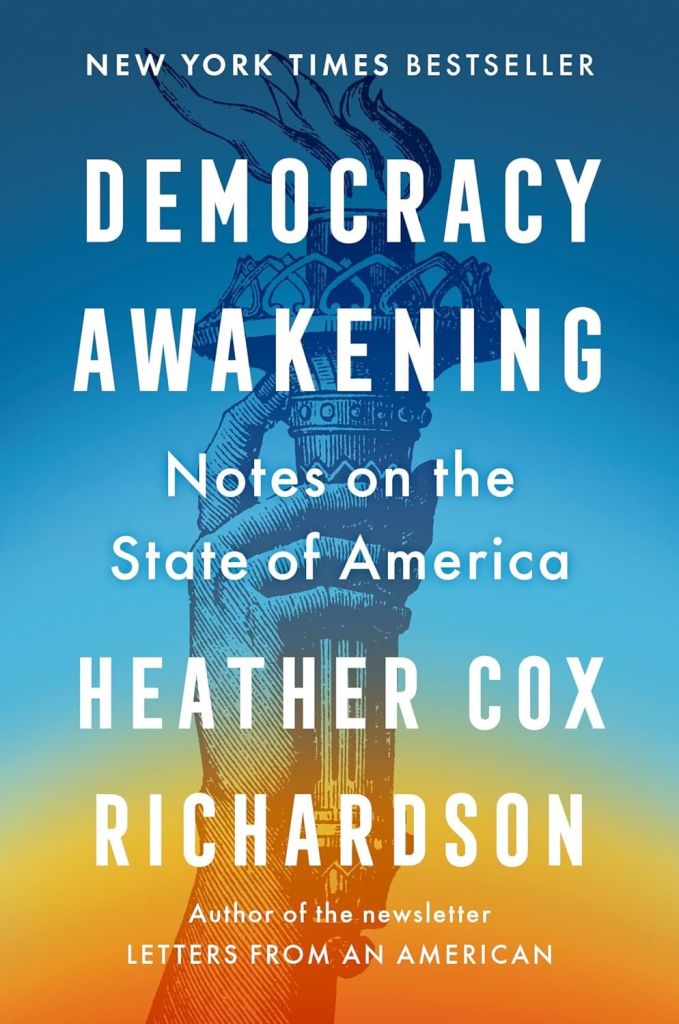Richardson’s latest shows democracy is a process
Published 10:03 am Thursday, March 7, 2024

- Cover
“Democracy Awakening: Notes on the State of America,” by Heather Cox Richardson. New York: Viking, 2023. 286 pages. $30 Hardback.
Heather Cox Richardson is a dynamo. While her day job is history professor at Boston College, her wider reputation rests on six previous books on American history, her work as an NPR and podcast host, and her Internet newsletter, “Letters from an American,” read by well over a million subscribers. Look it up and give it a try, it’s free!
Trending
While Richardson’s politics are liberal, her writing is rooted in a deep knowledge of history. Where journalists see only yesterday’s sensation, she sees another thread in a 250-year-old tapestry woven of two distinct colors. Call them blue and red.
According to “Democracy Awakening,” America has always vacillated between two opposed visions. Some think government should be widely shared and widely beneficial – “of the people, by the people and for the people,” as Lincoln put it. Others believe us plebs must be managed by those who know better or have more at stake, and that government must prioritize the interests of this special class.
The split between these mindsets, Richardson says, was already apparent in the nation’s founding documents. Thomas Jefferson’s Declaration of Independence is a ringing endorsement of equality and unalienable rights, while the Constitution veers toward concentrated power, a representative system dominated by propertied white men.
America’s spreading the vote to commoners, Black men, women, and 18-year-olds represents a slow swing in the democratic direction, and Richardson believes this is our history’s true path. But each step has encountered conservative backlash. “Democracy Awakening” shows how this push-pull between broad democracy and special interests is a fundamental theme of America’s politics.
In modern times, for instance, we have democratic initiatives such as child tax credits, infrastructure projects, consumer protection, environmental controls, and the embattled Civil Rights and Voting Rights acts, all meant to bolster ordinary citizens’ interests and opportunities.
On the other side are efforts friendly to minority rule: gerrymandering, rigging the Supreme Court to protect unpopular policies, resisting plebiscites, and prolonging inequities such as Wyoming’s 500,000 citizens getting the same number of senators as California’s 39 million, or the Electoral College, which put George W. Bush and Donald Trump in the White House despite both men losing the popular vote.
Trending
We’re all familiar with contemporary matters such as these, but Richardson goes on to show that Americans have faced the same issues throughout our history.
The Civil War was about slavery, but Southern elites also wanted to add slavery-friendly states to the union (each with a disproportionate number of senators and representatives) to back their exclusive interests. Meanwhile, even with a war to manage, President Lincoln created new opportunities for ordinary citizens, passing the Homestead Act and establishing land-grant colleges and the Department of Agriculture, among other populist measures.
The Reconstruction Period (1861-1900) is Richardson’s specialty and she gives a brilliant account of how the North’s triumph in the Civil War was quickly undercut by Jim Crow efforts to preserve minority power through poll taxes, rigged voter tests, terror, and lynching.
Later chapters cover Teddy Roosevelt’s campaigns against political corruption and monopolies; the New Deal years when FDR brought the nation out of the Great Depression by putting ordinary people back to work and supporting their old age; Truman and Eisenhour’s desegregation policies; and LBJ’s Great Society initiatives to reduce poverty and widen voting and civil rights.
At every turn, Richardson reminds us how few of today’s contested issues are new. The theory of trickle-down economics was promoted by Gilded Age robber barons and soundly rebutted by William Jennings Bryan over a century ago. Trickle-up, on the other hand, was one of President Lincoln’s pet ideas. He thought society was best served when commoners like himself prospered and spread their good fortune around them and up through the ranks. When southern reactionaries feared Blacks with the vote would want roads and schools, they branded it “socialism,” a 150-year-old slur right wingers still apply to anything they dislike.
Some of America’s worst riots were against German and Irish immigrants, including Kentucky’s own Bloody Monday, August 6, 1885, when 22 people were left dead in Louisville. Later, eastern European immigrants were equally scorned. Nowadays, many descendants of these once unwanted immigrants complain that newly arrived Latinos are somehow “poisoning” their blood.
One of the book’s delights for me was its celebration of semi-forgotten progressives like desegregationist Ida B. Wells, Frances Perkins – the country’s longest serving secretary of labor – and Jane Addams, whose Settlement House movement helped countless immigrant women acclimate to their new country.
Along with the usual suspects, Richardson’s list of good presidents includes Grover Cleveland, Rutherford Hayes, and James Garfield, who were only half-remembered names to me until she explained how they foiled an early attempt to defund the government in the name of anti-progressive causes. Sound familiar?
While the title, “Democracy Awakening,” might suggest our wakening is now complete, it certainly isn’t. Richardson’s historical survey shows how American democracy has been fitfully chugging toward a more perfect form, but the process is precarious and far from over. “[T]he true history of American democracy is that it is never finished” she writes. “It is the story of people who have honored the idea that a nation can be based, not in land or religion or race or hierarchies, but rather in the concept of human equality.” A fine summation and a bracing thought just as our democratic system of government faces a raft of new threats.
– Reviewed by Joe Glaser, WKU English Department.






